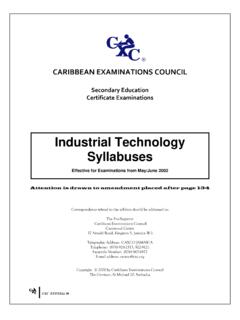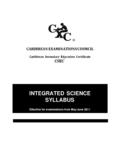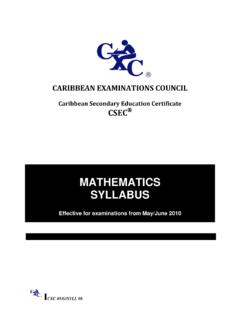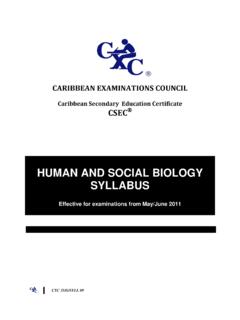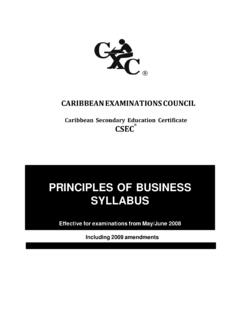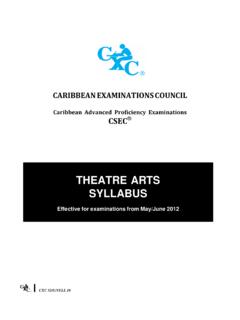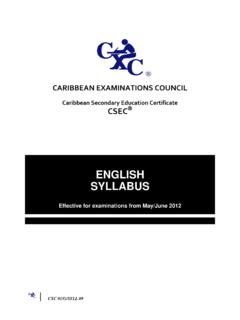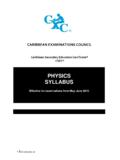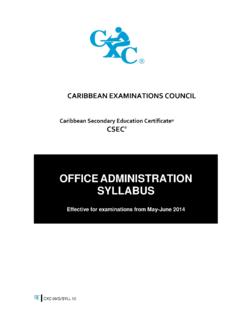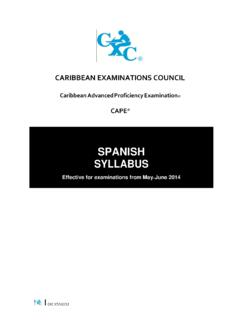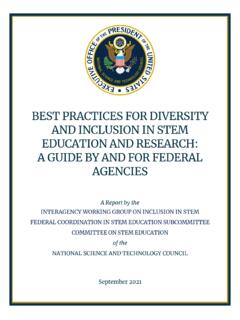Transcription of Applied Mathematics Syllabus - CXC | Education
1 CARIBBEAN EXAMINATIONS COUNCIL Caribbean Advanced Proficiency Examinations CAPE . Applied Mathematics . Syllabus . Effective for examinations from May/June 2008. Including amendments up to 2008. Published by the Caribbean Examinations Council 2010, Caribbean Examinations Council All rights reserved. No part of this publication may be reproduced, stored in a retrieval system, or transmitted in any form, or by any means electronic, photocopying, recording or otherwise without prior permission of the author or publisher. Correspondence related to the Syllabus should be addressed to: The Pro-Registrar Caribbean Examinations Council Caenwood Centre 37 Arnold Road, Kingston 5, Jamaica, Telephone: (876) 630-5200.
2 Facsimile Number: (876) 967-4972. E-mail address: Website: Copyright 2007, by Caribbean Examinations Council The Garrison, St Michael BB14038, Barbados CXC A9/U2/07. Content s RATIONALE .. 1. AIMS .. 1. SKILLS AND ABILITIES TO BE ASSESSED .. 2. PRE-REQUISITES OF THE Syllabus .. 4. STRUCTURE OF THE 4. RECOMMENDED 2-UNIT OPTIONS .. 4. UNIT 1: STATISTICAL ANALYSIS. MODULE 1: Collecting and Describing 5. MODULE 2: Managing Uncertainty .. 9. MODULE 3: Analyzing and Interpreting 17. UNIT 2: MATHEMATICAL APPLICATIONS. MODULE 1: Discrete 25. MODULE 2: Probability and 31. MODULE 3: Particle 36. OUTLINE OF ASSESSMENT .. 53. REGULATIONS FOR PRIVATE 68. REGULATIONS FOR RE-SIT CANDIDATES.
3 68. ASSESSMENT GRID .. 68. Applied MATHEMATICAL 69. MISCELLANEOUS SYMBOLS .. 70. iii CXC A7/U1/07. The Statistical Analysis and Applied Mathematics Syllabuses were merged to create a new 2-Unit Syllabus for Applied Mathematics . This document CXC A9/U2/07, therefore, replaces CXC A7/U1/04 and CXC. A9/U1/04 issued in 2004. Please note that the syllabuses have been revised and amendments are indicated by italics. First Issued 1999. Revised 2004, 2007. Please check the website, for updates on CXC's syllabuses CXC A9/U2/07. Introduction T he Caribbean Advanced Proficiency Examination (CAPE) is designed to provide certification of the academic, vocational and technical achievement of students in the Caribbean who, having completed a minimum of five years of secondary Education , wish to further their studies.
4 The examinations address the skills and knowledge acquired by students under a flexible and articulated system where subjects are organised in 1-Unit or 2-Unit courses with each Unit containing three Modules. Subjects examined under CAPE may be studied concurrently or singly. The Caribbean Examinations Council offers three types of certification. The first is the award of a certificate showing each CAPE Unit completed. The second is the CAPE diploma, awarded to candidates who have satisfactorily completed at least six Units, including Caribbean Studies. The third is the CAPE Associate Degree, awarded for the satisfactory completion of a prescribed cluster of seven CAPE Units including Caribbean Studies and Communication Studies.
5 For the CAPE diploma and the CAPE Associate Degree, candidates must complete the cluster of required Units within a maximum period of five years. Recognized educational institutions presenting candidates for CAPE Associate Degree in one of the nine categories must, on registering these candidates at the start of the qualifying year, have them confirm in the required form, the Associate Degree they wish to be awarded. Candidates will not be awarded any possible alternatives for which they did not apply. v CXC A7/U1/07. CXC A9/U2/07. Applied Mathematics RATIONALE Syllabus Mathematics and its applications are quickly becoming indispensable in our modern technological world.
6 Advancement in fields of applications has prompted the use of computational techniques unique to particular entities. The discipline of Applied Mathematics must respond to the demands of conceptual analysis, principles and problem solving for a new world filled with more advanced tools of technology . The main emphasis of the Applied course is on developing the ability of the students to start with a problem in non-mathematical form and transform it into mathematical language. This will enable them to bring mathematical insights and skills in devising a solution, and then interpreting this solution in real-world terms. Students accomplish this by exploring problems using symbolic, graphical, numerical, physical and verbal techniques in the context of finite or discrete real-world situations.
7 Furthermore, students engage in mathematical thinking and modelling to examine and solve problems arising from a wide variety of disciplines including, but not limited to, economics, medicine, agriculture, marine science, law, transportation, engineering, banking, natural sciences , social sciences and computing. Driven by computational technology , much mathematical power and efficiency have been provided to teachers and students through the use of calculators and computers. This course incorporates the use of appropriate and relevant technology . These technological skills that students would require would prove vital to them as they present and analyse data for a research component.
8 It is also recognized that Mathematics is a principal gateway to technical and professional careers and academic interests for an increasing number of students in a widening range of subjects in the curriculum. Therefore, this Applied Mathematics Syllabus makes provision for this diversity through two carefully articulated Units that are available to students. Both Units employ a stepwise logical approach using mathematical reasoning, principles and patterns to develop models, test conjectures and judge validity of arguments and conclusions. Thus, the mathematical concepts explored establish the importance of reasoning, counting, modelling and algorithmic thinking.
9 This Syllabus will contribute to the development of the Ideal Caribbean Person as articulated by the CARICOM. Heads of Government in the following areas: demonstrate multiple literacies, independent and critical thinking and innovative application of science and technology to problem solving. Such a person should also demonstrate a positive work attitude and value and display creative imagination and entrepreneurship . In keeping with the UNESCO Pillars of Learning, on completion of this course the study, students will learn to do, learn to be and learn to transform themselves and society. AIMS. The Syllabus aims to enable students to: 1. equip themselves with tools of data collection, data organization and data analysis in order to make valid decisions and predictions.
10 2. develop research skills needed for productive employment, recreation and life-long Education ;. 1. CXC A9/U2/07. 3. use of appropriate statistical language and form in written and oral presentations;. 4. develop an awareness of the exciting applications of Mathematics ;. 5. develop a willingness to apply Mathematics to relevant problems that are encountered in daily activities;. 6. understand certain mathematical concepts and structures, their development and their interrelationships;. 7. use calculators and computers to enhance mathematical investigations;. 8. develop a spirit of mathematical curiosity and creativity;. 9. develop the skills of recognizing essential aspects of real-world problems and translating these problems into mathematical forms.
